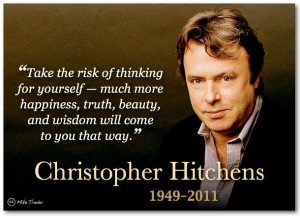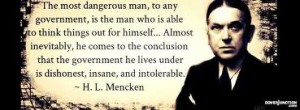As I was shaving the other morning, I listened to an NPR report on a new development in genetics research and the ethical questions that it raised.
Immediately after the segment concluded, the station jumped to their spring fundraising drive, which included a testimony from a local listener who praised NPR because it gave her the facts of an issue. This allowed her to “decide on her own,” without having anybody tell her what she ought to think about the issue.
In America, of course, the ideal of thinking for oneself is considered a Great Thing.
But let me lay out a few reasons why I think we have problems here. When I am finished you can decide for yourself whether or not thinking for yourself is really such a great thing.
Consider the NPR segments. I have to confess that I really do not know a lot about the field of genetics and bioethics. However, I know enough about academic life to know that very bright people spend long hours every day for decades on a rather specific set of intellectual questions. This is true of the fields of genetics, ethics and bioethics. Every year, academics produce hundreds of dense books in these areas. And they do not agree with one another. Quite frankly, it is all very complicated.
So how is a five-minute news segment that I listen to while brushing my teeth going to provide me with what I need to know? If I am “thinking for myself” here, am I going to reach a clear conclusion on these very complicated issues?
Answer: no.

Christopher Hitchens, you see, came up with this idea all by himself, without being influenced at all by others, such as…….
Yet we are pretty convinced that we have the ability to arrive at the truth — even of very complicated matters — simply by “thinking for ourselves.” Interestingly, those of us who believe that we should “think for ourselves,” did not arrive at this conviction on our own, but largely believe it because we believe the authority of others who tell us we should “think for ourselves.” This faith in our own thinking has been handed down to us in our culture from a peculiar mix of Enlightenment views of rationality and American democratic faith that every person can easily discern what is true.
But there are some things — many things — that are far too complicated to figure out without the help of knowledgeable, thoughtful people. Like genetics and bioethics.
Maybe, for instance, I can figure out ethics and religious truth on my own, especially if I have the Bible in my hands. Can’t I figure out right and wrong and the truths of Christianity without anybody telling me what to think?
Consider how the following individuals from the past approached the study of the Bible and the quest to determine what is true.
Elhanan Winchester (1751-1791). “I shut myself up chiefly in my chamber, read the Scriptures, and prayed to God to lead me into all truth, and not suffer me to embrace any error; and I think with an upright mind, I laid myself open to believe whatsoever the Lord had revealed.”
Noah Worcester (1758-1837) Individuals should abandon a “passive state of mind” that deferred to great names in theology. “The scriptures were designed for the great mass of mankind and are in general adapted to their capacities.”
Lucy Mack Smith (1776-?) “I…determined to examine my Bible, and taking Jesus and the disciples as my guide, to endeavor to obtain from God that which man could neither give nor take away…The Bible I intended should be my guide to life and salvation.”
Alexander Campbell (1788-1866) “The Bible alone must always decide every question involving the nature, the character or the designs of the Christian institution. Outside of the apostolic canon, there is not, as it appears to me, one solid foot of terra firma on which to raise the superstructure ecclesiastic.”
John Humphrey Noyes (1811-1886) “I had long been in the belief that the Bible was not a book of inexplicable riddles, and I determined to solve this mystery (of Christ’s second coming). Accordingly, I read the New Testament ten times with an eye on the question as to the time of Christ’s second coming, and my heart struggling in prayer for full access to the truth.”

….the great intellectual and perfume designer Coco Chanel, who also came up with this idea all by herself and was certainly not influenced by anybody else, like……
What we have here are five individuals who, in all sincerity, tried to determine the truth of what the Bible says. All believed that the Bible alone would be their authority for religious truth. Each one believed that they could clearly ascertain the truth of the Bible by reading it without any authority, theology, creed, system or philosophy guiding them. They would “think for themselves” on these issues. The truth of the Bible, in other words, would be plain to them, just as it would to anyone who read it.
And what did they conclude?
Elhanan Winchester concluded that the Bible taught that God will save everyone and that nobody would go to hell. He became a leader in the Universalist church.
Noah Worcester concluded that the Bible showed that there was no Trinity. Jesus was not God and there was no such thing as the Holy Spirit. He became a Unitarian.
Lucy Mack Smith concluded that Bible showed that current churches were all corrupt. She (somehow) convinced a minister to baptize her as a solitary Christian, without any connection to any church. Interestingly, years later her son, Joseph Smith, also prayed that God would show him the truth clearly, and he went on to found the Church of the Latter Day Saints, or the Mormons.
Alexander Campbell became convinced that the Bible showed that Christians should not bring anything into church life that was not mentioned in the Bible. Denominations, for instance, were not found in the Bible, so Campbell helped found the Christian Connection, which was a movement that attempted to operate without denominational organization. This is what we know as the Church of Christ, or Disciples of Christ. Campbell also believed the Bible showed that communion should be offered every Sunday and that no musical instruments should be used in worship, other than those specifically mentioned in the Bible.
John Humphrey Noyes became convinced that the Bible showed that Christ’s Second Coming already took place in the first century. We therefore have the means to become perfect. His solution to this was to found the Oneida colony, based on Christian perfection and mutual sharing. Under Noyes’ direction, the Oneida colony shared all possessions, experimented in eugenics, created a “theocratic democracy” and instituted “complex marriage,” in which all males were married to all females. (The Bible may be simple. But complex marriage? It’s complicated.)

….H.L. Mencken, who always thought for himself and never arrived at idea with the help of anyone else, like…..
Now, there are truths in the Bible that are simple to see and understand. Six year-old children can understand that God loves them. Do not expect the little ones, however, to explain how we Christians are supposed to use the Bible to work out proper political, military, social and cultural policies to address the problems of the Middle East.
We have here a particular tradition of thought in American culture. Winchester, Worcester, Smith, Campbell and Noyes — as well as the woman who gave the testimony on NPR — all believed in the perspecuity of truth.
“Perspecuity” refers to truths that are plain and obvious to all. It is a fun word. Try it out some time. Amaze your friends by slipping the word in during conversations at dinner parties, the water cooler at work, chats at the fitness center, or pot-luck dinners.
We would say the equation 2+3=5 is “perspicacious” (which is a rollicking variation on the word “perspecuity,” for those of you who want to really cut loose). In other words, the truth of this mathematical sum is obvious to everyone who can grasp the concepts of numbers and addition. Christians, Hindus, Democrats, Republicans, Chinese, Zulus and even New York Yankee fans can all see clearly that 2 and 3 make 5.

….that Great American (?) Voltaire, who certainly thought for himself and helped to give us all this great advice that we should not simply listen to him or Mencken or Chanel or Hitchens but…
American Christians have often argued (whether they realize it or not — it hasn’t always been obvious to them) that the Bible is perspicacious. Anybody, regardless of their faith commitment, ought to be able to pick up the Bible and see everything there in a clear, simple and obvious way.
But it is important to note that for most of history, the leading Christian thinkers and theologians understood that sin distorted our thinking. Augustine, Thomas Aquinas, Martin Luther, John Calvin, Jonathan Edwards — all the heavy hitters –argued that sin could affect our thinking in such a way that we would not always see truth clearly. Of course, they were building on biblical texts — such as Jesus’ famous admonishment to take the log out of your own eye before you try to take the speck out of your neighbor’s eye. Or read John 9 carefully, with this in mind. We often believe we are seeing the truth clearly when sin is actually distorting our perceptions. This was an accepted part of Christian theology for centuries.
And then something switched.
American Christians largely stopped discussing how sin affected our thinking. Sin, it was thought, was primarily the conscious disobedience of a principle. In other words, I know and see what is right, but I don’t do it. That’s pretty much all that sin is, it was thought. Erroneously.
When did this happen?
October 24, 1790 at 10:37 a.m., Eastern Standard Time.
Well, no. Even as a historian, I can’t see the past clearly enough to put an exact date on the shift. (And time zones weren’t invented until nearly 100 years after this. The EST comment was just one of those tricky things that historians sometimes throw at you for their own weird sense of entertainment.)

….rather create a culture where we tell children to listen carefully to us and think like we do so that they will not ever listen to us or anybody else but themselves. Right?
But there was some sort of intellectual shift that took place in the late 18th and early 19th centuries, as can be seen by the individuals described above. It is still with us today, in different forms, as evidenced by our great desire to “think for ourselves.”
As for me, I should remember that I need the help of many others to see more clearly. For instance, I’m thankful for a nice little book written by my colleague, Steve Moroney, that outlines these points. It’s not easy to find, but you might look for The Noetic Effects of Sin, if you want to explore this topic further. This post also draws upon chapters by Nathan Hatch and George Marsden in a book called The Bible in America. Most importantly, the Holy Spirit helps convict me when I don’t want to see certain truths and would rather see a distorted view of things. (Of course, I need to listen to the Holy Spirit in these situations, which I don’t always do.)
Think for myself? I can’t come up with any of these points on my own. I can’t see things clearly without listening the insight of others. And quite frankly, I’d be an unbearable human being if I simply thought for myself.
I apologize that this post is so long. It turns out that the idea of the perspecuity of truth is not an obvious, clear and perspicacious thing to explain.
